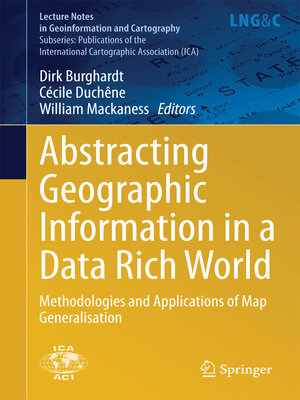Abstracting Geographic Information in a Data Rich World
ebook ∣ Methodologies and Applications of Map Generalisation · Lecture Notes in Geoinformation and Cartography
By Dirk Burghardt

Sign up to save your library
With an OverDrive account, you can save your favorite libraries for at-a-glance information about availability. Find out more about OverDrive accounts.
Find this title in Libby, the library reading app by OverDrive.



Search for a digital library with this title
Title found at these libraries:
| Library Name | Distance |
|---|---|
| Loading... |
Research in the field of automated generalisation has faced new challenges in recent years as a result of technological developments in web-based processing, new visualisation paradigms and access to very large volumes of multi-source data generated by sensors and humans. In these contexts, map generalisation needs to underpin 'on-demand mapping', a form of mapping that responds to individual user requirements in the thematic selection and visualisation of geographic information. It is this new impetus that drives the research of the ICA Commission on Generalisation and Multiple Representation (for example through its annual workshops, biannual tutorials and publications in international journals). This book has a coherent structure, each chapter focusing on core concepts and tasks in the map generalisation towards on-demand mapping. Each chapter presents a state-of-the-art review, together with case studies that illustrate the application of pertinent generalisation methodologies. Thebook addresses issues from data gathering to multi scaled outputs. Thus there are chapters devoted to defining user requirements in handling specifications, and in the application and evaluation of map generalisation algorithms. It explores the application of generalisation methodologies in the context of growing volumes of data and the increasing popularity of user generated content.







